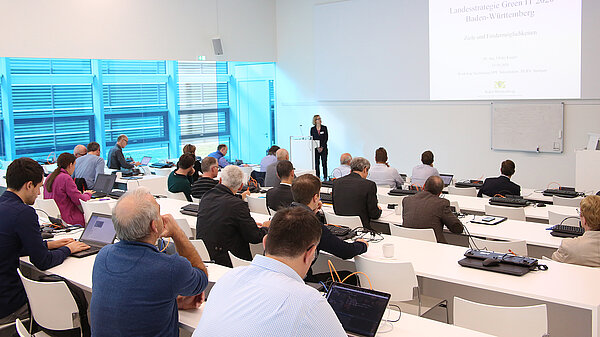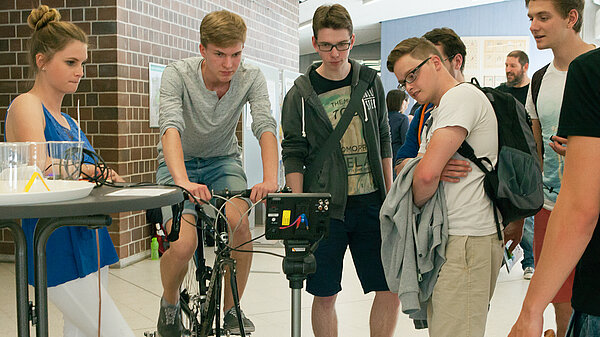High-Performance Computing Center Stuttgart

HLRS interacts regularly with administration and other institutes at the University of Stuttgart to identify synergies that could lead to campus-wide environmental gains. We also meet with representatives of high-performance computing (HPC) centers at other universities and in the private sector to exchange insights about topics that are relevant for improving sustainability in supercomputing. Additional outreach efforts include engaging scientific and industrial users of HPC, as well as the general public. The following are some components of HLRS's sustainability outreach.
In order to provide useful information for other HPC centers striving to improve their environmental management, HLRS has published detailed information about its approach, goals, and accomplishments. This information can be found in our Sustainability Policy, Sustainability Report (German - PDF, 4.7 MB), and our annual Environmental Statement (PDF, 3.7 MB), a requirement of our EMAS certification.

HLRS's HPC training program aims to improve competency among scientific users of our supercomputing resources in ways that also support sustainability. This includes focusing on best practices in parallel programming, performance optimization, computing cluster administration, and other topics that are relevant for environmental performance. Our emphasis on improving application performance not only helps to maximize the amount of computing time we can provide our users, but also reduces the energy consumption required for complex simulations.
In addition to our course program, HLRS's user support staff holds an annual workshop that helps users to improve the performance of their codes. During the year, the team also works closely with system users to provide personalized support aimed at programming optimization.
Working with the Supercomputing Academy, HLRS also helped to develop an innovative training module on economic and sustainability issues in supercomputing that is designed for administrators of supercomputing clusters in industry. The course was offered for the first time in April 2020.
The HLRS Sustainability Program has organized and hosted conferences that bring together managers of HPC centers to discuss how they are addressing questions of sustainability. Past events have focused on sustainable infrastructure development, energy efficiency, and other related topics.
HLRS also organizes academic workshops focusing on optimizing sustained simulation performance and encourages optimization of code performance as part of our annual Golden Spike Awards.

As part of HLRS's emphasis of engaging its employees as integral participants in our sustainability efforts, the Sustainability Program organizes annual workshops to inform employees about developments in sustainability at HLRS, and to invite suggestions for improving sustainable operations. Moreover, we organize events for HLRS staff focusing on other dimensions of sustainability, bringing in guest speakers to provide orientation for environmentally responsible decision making in our daily lives.
HLRS participates in public events focused on the subject of sustainability to encourage broader engagement with this important topic. This has included taking part in the state of Baden-Württemberg's Nachhaltigkeitstage (Sustainability Days) as well as the University of Stuttgart's annual open house event, the "Tag der Wissenschaft" (Science Day). HLRS also attends trade fairs and public events to demonstrate its latest projects, including innovative applications of simulation in sustainable city planning.